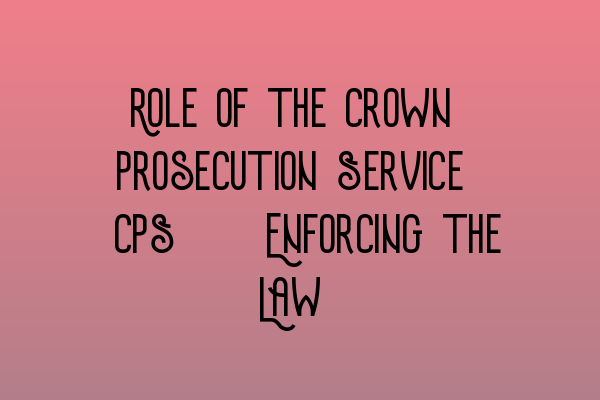Role of the Crown Prosecution Service (CPS): Enforcing the Law
The Crown Prosecution Service (CPS) plays a crucial role in the criminal justice system in the United Kingdom. As a solicitor practicing criminal law, it is essential to understand the significance of the CPS and its role in enforcing the law. In this article, we will explore the responsibilities of the CPS and shed light on its importance in the legal landscape.
What is the Crown Prosecution Service (CPS)?
The Crown Prosecution Service is an independent authority responsible for prosecuting criminal cases in England and Wales. It operates under the Code for Crown Prosecutors, which provides guidelines on determining whether there is sufficient evidence to prosecute and conducting fair and effective prosecutions.
As a solicitor, it is crucial to stay informed and prepared about updates in UK criminal laws. Visit our article on Updates in UK Criminal Laws: Staying Informed and Prepared to enhance your legal knowledge.
Role of the CPS
The primary role of the Crown Prosecution Service is to bring criminal cases to court and present the evidence against the accused. This involves making charging decisions, preparing cases for trial, and representing the prosecution during court proceedings.
The CPS works closely with the police and other investigative agencies to review the evidence collected during the investigation. They assess whether the evidence is sufficient to meet the legal requirements for charging an individual with an offense.
Once a charging decision is made, the CPS takes on the responsibility of preparing the case for trial. This involves gathering witness statements, reviewing evidence, and liaising with any expert witnesses who may be required to provide their specialized knowledge during the trial.
Are you looking to expand your expertise in criminal practice? Join our Workshops and Seminars on Criminal Practice to enhance your professional skills.
The CPS also has a duty to disclose all relevant evidence to the defense, ensuring a fair trial takes place. It is essential for the defense and prosecution to have access to all the evidence to present their case effectively.
The Importance of the CPS
The Crown Prosecution Service plays a vital role in upholding the rule of law and ensuring that justice is served. By prosecuting criminal cases, the CPS helps maintain public confidence in the legal system and protects the rights of individuals.
If you are preparing for the SQE Criminal Practice exam, our mock tests can simulate the exam experience and help you achieve success. Learn more about our Mock Tests for SQE Criminal Practice: Exam Simulation for Success.
The CPS’s work is not only limited to serious criminal offenses. It also handles a range of cases, including minor offenses, which contribute to promoting and maintaining law and order in society.
Enhancing Your Criminal Law Study Group Experience
Studying criminal law and preparing for exams can be challenging. Are you looking for ways to enhance your SQE criminal law study group experience? Check out our article on Enhancing Your SQE Criminal Law Study Group Experience for helpful tips and strategies.
Conclusion
The Crown Prosecution Service plays a vital role in enforcing the law and bringing criminals to justice. Their responsibilities extend from making charging decisions to presenting evidence in court. By understanding the role of the CPS, solicitors can effectively navigate the criminal justice system and ensure justice is served.
For a detailed analysis of criminal evidence rules, don’t miss our article on Decoding Criminal Evidence Rules: A Detailed Analysis.
